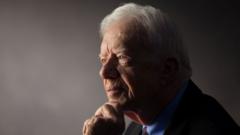In the four decades since Jimmy Carter left the Oval Office, the United States has faced enduring challenges that resonate eerily with those of 2024, emphasizing a cycle that seems inevitable no matter the leader. During Carter's administration, the nation grappled with economic instability and a wavering sense of national security, often manifesting as a crisis of confidence among citizens.
Today's landscape bears striking similarities: economic turmoil, geopolitical instability with Russia and Iran, and ongoing conflicts in the Middle East continue to cast a long shadow over Biden's presidency. Despite a moment of triumph at the Camp David Accords, Carter quickly faced the harsh realities of global limits during the Iranian hostage crisis, contributing to his electoral defeat in 1980.
Conversely, Biden encountered the fallout from the chaotic withdrawal from Afghanistan, a stark reminder of the shortcomings of American interventionism. Recently, the eruption of violence in Gaza has demonstrated the limits of US influence in a turbulent region, reiterating the ongoing difficulties of securing peace in a complex Middle Eastern landscape.
Similar to the critiques leveled against Carter regarding his response to the Soviet invasion of Afghanistan, Biden’s approach to the Russian invasion of Ukraine has underlined the challenges of maintaining a cohesive foreign policy. While Biden appears to have rallied international allies for support, the prolonged conflict has tested American resolve as growing instability engenders fears of a wider geopolitical fallout.
Moreover, Carter's contemporaneous struggles with domestic policy regarding inflation and energy during the 1970s closely echo Biden's current challenges, as both presidencies sought innovative solutions during times of crisis. While Biden has benefitted from a growing job market that Carter could not claim, inflation is still an essential aspect of Biden's public perception, derived in part from global conflicts and economic uncertainties.
Equally significant is the enduring American distrust in governmental authority. Carter famously spoke of a "crisis of confidence," a sentiment that resonates today amidst persistent skepticism reflected in public opinion polls, which show a divided electorate.
As political observers reflect on the legacies of both presidents, comparisons arise, often controversially, as figures like Donald Trump invoke these parallels to critique the current administration. Each leader has epitomized varying relationships with power and public perception, with Carter's humility contrasting sharply against Trump's theatricality.
Carter's post-presidency illustrates a life dedicated to humanitarian efforts, in stark contrast with Trump's preoccupation with political power and grievances. This reflection on Carter’s enduring impact serves as both a lesson and a cautionary tale for Biden, as the latter continues to navigate the complexities of leadership in an era not so different from the one faced by his predecessor.
From the challenges of foreign policy to laboring with domestic discontent, the remnants of Carter's presidency linger as a reminder that while decades may pass, the fundamental issues pertaining to American governance seem timeless.
Today's landscape bears striking similarities: economic turmoil, geopolitical instability with Russia and Iran, and ongoing conflicts in the Middle East continue to cast a long shadow over Biden's presidency. Despite a moment of triumph at the Camp David Accords, Carter quickly faced the harsh realities of global limits during the Iranian hostage crisis, contributing to his electoral defeat in 1980.
Conversely, Biden encountered the fallout from the chaotic withdrawal from Afghanistan, a stark reminder of the shortcomings of American interventionism. Recently, the eruption of violence in Gaza has demonstrated the limits of US influence in a turbulent region, reiterating the ongoing difficulties of securing peace in a complex Middle Eastern landscape.
Similar to the critiques leveled against Carter regarding his response to the Soviet invasion of Afghanistan, Biden’s approach to the Russian invasion of Ukraine has underlined the challenges of maintaining a cohesive foreign policy. While Biden appears to have rallied international allies for support, the prolonged conflict has tested American resolve as growing instability engenders fears of a wider geopolitical fallout.
Moreover, Carter's contemporaneous struggles with domestic policy regarding inflation and energy during the 1970s closely echo Biden's current challenges, as both presidencies sought innovative solutions during times of crisis. While Biden has benefitted from a growing job market that Carter could not claim, inflation is still an essential aspect of Biden's public perception, derived in part from global conflicts and economic uncertainties.
Equally significant is the enduring American distrust in governmental authority. Carter famously spoke of a "crisis of confidence," a sentiment that resonates today amidst persistent skepticism reflected in public opinion polls, which show a divided electorate.
As political observers reflect on the legacies of both presidents, comparisons arise, often controversially, as figures like Donald Trump invoke these parallels to critique the current administration. Each leader has epitomized varying relationships with power and public perception, with Carter's humility contrasting sharply against Trump's theatricality.
Carter's post-presidency illustrates a life dedicated to humanitarian efforts, in stark contrast with Trump's preoccupation with political power and grievances. This reflection on Carter’s enduring impact serves as both a lesson and a cautionary tale for Biden, as the latter continues to navigate the complexities of leadership in an era not so different from the one faced by his predecessor.
From the challenges of foreign policy to laboring with domestic discontent, the remnants of Carter's presidency linger as a reminder that while decades may pass, the fundamental issues pertaining to American governance seem timeless.


















